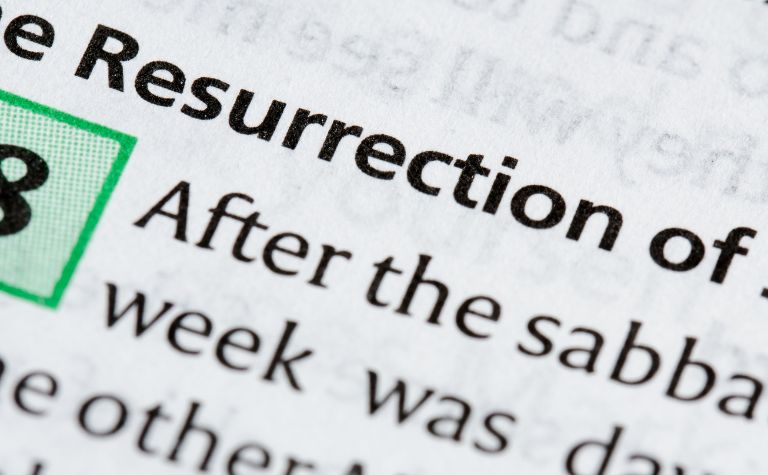For many people, celebrating Easter consists of hiding eggs and candy for children to find, gathering with family and friends to share a meal, and doing other Springtime activities like playing or watching sports. Yet, Easter Sunday has a deeper, spiritual meaning that is over 2,000 years old. In fact, the ultimate reason for Easter answers life’s biggest questions about life and death.
The spiritual meaning of Easter is rooted in the resurrection of Jesus of Nazareth. God the Father sent his son Jesus into the world to save people from sin and its consequences, which is eternal death. Jesus’ resurrection enables the salvation and future resurrection of those who trust and follow him.
Why is Jesus’ resurrection so important? What are three ways Jesus’ resurrection from the dead impacts Christians today? What does it enable, guarantee, and ensure? How did Easter transform from commemorating Jesus’ resurrection to celebrating the Easter Bunny, eggs, and hidden candy? Keep reading to learn the answers to these questions and others.
Also, Christians have different traditions in their observance of Good Friday and Easter. Discover what Easter Monday is and why it’s important to many Christians.

Why is Jesus’ resurrection so important?
In the New Testament, the Apostle Paul wrote that Christianity is meaningless without the resurrection of Jesus from the dead. “And if Christ has not been raised, your faith is futile and you are still in your sins” (1 Cor. 15:17, ESV).
The Greek word translated as “futile” (mataios) means useless and empty. The KJV translates the word “vain.” The NASB translates it as “worthless.”
How does the fact that Jesus rose from the dead over 2,000 years ago alter people’s lives today? First, the resurrection confirms Jesus’ teaching about who he was and why he came to earth and died (Luke 19:10).
It also validates the historical truthfulness of the Christian faith. Furthermore, it impacts the lives of Jesus’ followers, from first-century believers to twenty-first-century Christians today.
Jesus’ resurrection enables sinners to be born again
Though the term “born again” is important because it comes directly from Jesus (John 3:3). Being “born again,” or what theologians sometimes refer to as “regeneration,” refers to the new nature that a sinner receives after they have repented of sin and put their trust in Jesus to save them. The unconverted have one nature; the converted have a new one (John 3:3-8; James 1:18; 1 Pet. 1:23-25).
- 1 Peter 1:3 reads, “Blessed be the God and Father of our Lord Jesus Christ! According to his great mercy, he has caused us to be born again to a living hope through the resurrection of Jesus Christ from the dead” (ESV, emphasis added; cf. John 3:3).
- Ephesians 2:5 reads, “Even when we were dead in our trespasses, [God] made us alive together with Christ — by grace you have been saved” (ESV, emphasis added).
Jesus’ resurrection guarantees the justification of sinners
The term “justification” describes God’s declaration about a converted sinner. Before conversion, a person’s legal status before God was guilty. Afterward, because of Jesus’ death and resurrection, God declares them righteous. The guilt status of sinners transfers to Jesus; his righteousness transfers to them (Rom. 3:25; 5:9, 18-19).
- Romans 4:25 reads, Jesus “was delivered up for our trespasses and raised for our justification” (ESV).
- Ephesians 2:6 reads, God “raised us up with [Jesus] and seated us with him in the heavenly places in Christ Jesus” (ESV).
Jesus’ resurrection ensures believers will have perfect bodies in the future
Physicality isn’t evil, contrary to the teaching of some ancient worldviews. God created matter, including people’s bodies (Gen. 1-2). Jesus was a human being with an actual physical body (John 1:1, 1:14).
However, sin has corrupted God’s creation, including bodies, which are now weak, frail, and subject to death. But just as God raised Jesus with a glorified body (e.g., John 20:27), he will raise Christians with one, too (1 Cor. 15:42-44).
- Romans 8:23, “And not only the creation, but we ourselves, who have the firstfruits of the Spirit, groan inwardly as we wait eagerly for adoption as sons, the redemption of our bodies” (ESV; cf. 2 Cor. 5:4).
- 1 Corinthians 15:20, “But in fact Christ has been raised from the dead, the firstfruits of those who have fallen asleep” (ESV; cf. 2 Cor. 4:14).
Also, many people know that Judaism and Christianity are closely related. Discover what the relationship between Passover and Easter is and why it’s important.

From Jesus’ Resurrection to the Easter Bunny
Many wonder how a holiday commemorating God becoming a man, dying for sin, and then rising from the dead, thereby saving people from sin, turned into a day when people hide eggs and candy for children.
Why do people replace the empty tomb with chocolate eggs? As Western societies become less religious, many people in them still like aspects of Christian holidays, so they keep the parts they want, such as gathering with family and friends and abandon the parts they don’t, like going to church. From the secular perspective, hunting for candy has no underlying meaning or significance.
Do secular societies replace other Christian holidays besides Easter?
No Christian holiday is immune from secular whitewashing. Like the Easter Bunny has replaced God’s salvation in the hearts and minds of some households, traditions about Santa Claus have taken over the historical account of Jesus’ miraculous birth to Mary and Joseph at Christmas.
Jesus’ birth and resurrection declare that God loves sinners, has heard their cries, and stands ready to forgive them, but they were too distracted to hear him.
Non-Christians sometimes bemoan God’s alleged lack of activity in their lives. They charge him with neglect and blame him for the relational, financial, and physical challenges that befall them.
Yet, sadly, many have chosen Santa Claus and the Easter Bunny over recalling that God came for them (Christmas) and rescued them (Easter) from their ultimate problem, which is sin.
Should Christians abandon the Easter Bunny and Santa Claus? Followers of Jesus should use wisdom when participating in secular traditions, especially those that eclipse the biblical meaning of special commemorations. Some Christians make allowance for Santa Claus, whose legend is based on Saint Nicholas, a leader in the early church. Yet many find it more difficult to rationalize the Easter Bunny.
Also, many people know that Roman Catholics and Protestants have similarities and differences. Some people are curious if Catholics celebrate Easter. See the article for more insight.

What does the word Easter mean?
The Oxford Dictionary of Christianity refers to the writing of an English monk named Bede to explain the etymology of “Easter. It reads, “The derivation of the name ‘Easter” is uncertain. According to Bede (672-735 A.D.), it is connected with an Anglo-Saxon spring goddess ‘Eostere.'” [3] “Anglo-Saxon” refers to the language spoken in England in the Middle Ages.
What do bunnies have to do with Eostere?
To some in the Middle Ages, hares symbolized producing offspring without mating based on the wrong assumption that they were hermaphrodites who could reproduce on their own. Some leaders in the church thought this was analogous to Mary giving birth to Jesus since the Bible teaches that she was a virgin at the time of her conception.
Also, some people incorporate myth and legend into their celebration of the resurrection, like the Easter Bunny. Learn the facts about Easter to separate fact from fiction.
Related Questions
Easter is one of the most important dates on the Christian calendar. It's important because it's the annual day that believers gather in churches to celebrate the resurrection of Jesus Christ from...
The resurrection of Jesus Christ, along with his crucifixion, is the most important event in Christianity. Without it, the faith that Jesus founded would be groundless. As the Apostle Paul taught,...
